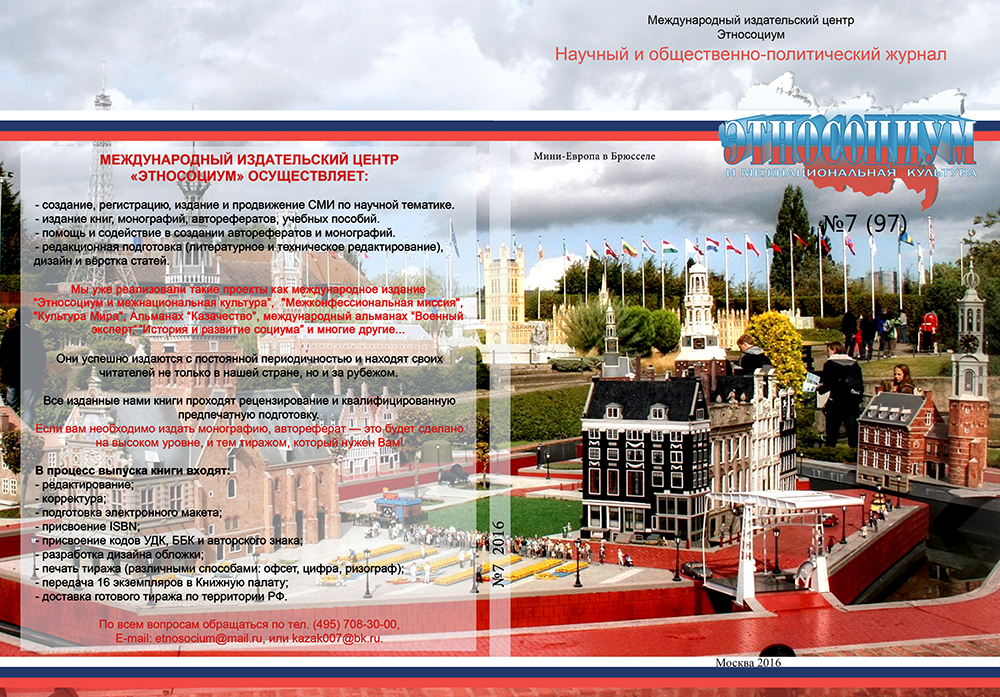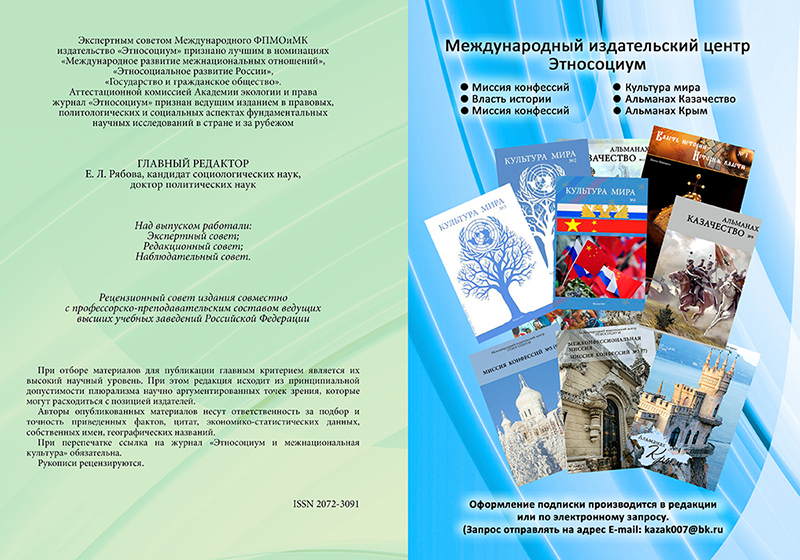

Content
|
COUNCIL OF INTERNATIONAL RELATIONSHIP
|
|
|
Mikhaylenko A.N. Russia in a polycentric world
|
9
|
|
Galaganova S.G. The idea of justice as a basic principle of national ideology: the spiritual and moral aspects
|
25
|
|
POLITICS, ECONOMICS, LAW:
ACTUAL PROBLEMS OF MODERN SOCIETY
|
|
|
Anciferova I.V., Ermakov V.M. Features of motivation mechanism of state and municipal employees
|
34
|
|
Tkachenko E.N. The development of non-profit organizations in modern Russian society
|
44
|
|
Avanesova A.A. Modern migration crisis: how to overcome
|
50
|
|
Rudakova S.V., Kosireva M.S., Murashko S.F., Bogoslovskaya V.R. International vocabulary in the Russian language: the experience of the twentieth century
|
54
|
|
Avdeev V.S. Information modernization of social processes as a vector of the transparency of public authorities
|
61
|
|
Stanjevsky F.A. The macro level of social interaction in the context of methodological individualism in the social sciences
|
68
|
|
POLITICS, ECONOMICS, LAW:
REGIONAL STUDY
|
|
|
Dzutsev K.V. Public opinion about the activities of the Prosecutor's Office of the Republic of North Ossetia, the North Caucasus Federal District of the Russian Federation
|
77
|
|
Anciferova I.V., Ermakov V.M. The specifics of the mentality of the state and municipal employees and forms of its manifestation
|
83
|
|
Bagaeva A.V. The historical model of regionalization and regional integration
|
93
|
|
Beysenbin K.A. Modern Trends in the Development of Ethnic Business in the Russian Federation
|
104
|
|
Bachaev A.A. Conflict potential of the modern media in covering ethnic issues
|
109
|
|
Ryabovа E.I., Bogatkevich T.A., Voloshin A.V. Problems of methodology of research of socio-labour sphere: economic and legal aspects
|
116
|
|
Suleymanov A.R. State national policy of the Russian Empire and Soviet Union
|
126
|
|
INTERNATIONAL RELATIONSHIPS:
POLITICS, ECONOMICS, LAW
|
|
|
Ternovaya L.O. The high art of military camouflage
|
136
|
|
Puzirev K.S. European superstate as a challenge and opportunity for Europe's regions: the choice of the UK
|
145
|
|
Beysenbin K.A. Modern Issues of Integration of Foreign Citizens in post-Soviet Russia
|
156
|
|
REVIEW
|
|
|
Smirnova M.I., Yanuskina V.V. Review of the Vlasov V.I. monograph «Reflections on God and divine»
|
163
|
|
Cheremnyh L.G., Myrashko S.F. Synthetic concept of space
|
166
|
|
Requirements to materials submitted to the international publishing house "Etnosocium"
|
171
|
The world is undergoing major changes in the direction of formation of a polycentric world. Against this background, the contradictions among the participants of international relations are intensifying, and their conflictness is increasing. The most appropriate approach to the development of a new world order is leadership. It is being used already to a certain degree by many countries. Russia has all foundations to develop its leadership status in the modern world.
Keywords: polycentric world, multipolar world, community-ness, stability, terrorism, India, Italy, China, Japan, OSCE, «G 7», leadership.
The idea of justice, based on principles of solidarity and cooperation and traditionally accepted by both Orthodox Christians and Moslems, is described as the basic consolidating factor for Russian society, as well as an identity-keeping remedy for the Christian culture of the West.
Keywords: justice, social justice, righteousness, Righteousness of God, national ideology, Russian National Idea.
The work deals with the nature, content, mechanism of motivation of employees, focusing on the identification of its specificity, distinguishing features, role in this type of profession.
Keywords: mentality, mindset, motivation, motivational readiness, the mechanism of their manifestations, objective and subjective determination, work motivation.
The article discusses some aspects of the development of nonprofit organizations in modern Russia. The main types of non-profit organizations to create and shape their organizational and legal form, the problem of development.
Keywords: non-profit organization, regulation, legal support and development.
The article analyzes the current global migration crisis, considered the original concept of the right to asylum, as well as put forward a number of proposals to overcome the crisis.
Keywords: forced migration, asylum, civil society, the right to asylum, the global migration crisis.
The article analyzes the international vocabulary, borrowed by the Russian language in the twentieth century. Special attention is paid to the socio-historical and historical-cultural aspects of the emergence, adaptation and development of international words in the Russian language.
Keywords: dialogue of cultures, international words, history of the Russian language and culture.
Trust is a special mechanism to ensure social order and sustained interaction between the actors in the political, economic, legal and social spheres. Significant role trust plays in the structure of the institutional and interpersonal relations in the military environment. In addition, political changes in society aimed at improving the effectiveness and legitimacy of the government, is impossible without the participation of the population. In this connection there is a need for increased attention to transparency, openness, availability of power on the part of civilian control.
This article looks at the key moments of the formation transporentnostnyh foundations of public authorities in the context of raising the level of confidence of citizens, as well as the work of news agencies. Presents the main aspects of information transparency for the public good.
Keywords: trust, transparency, public authorities, related to the government, members of the Federation, federalism, the attitude to power, Internet, news agencies.
The article addresses the issue of the micro-level of social interaction. This level presupposes two or several agents interacting with one another. Under some conditions specified in the article the process of interaction acquires autonomy of its own. In this case it cannot be reduced to the mere sum of individual agents’ actions. Some examples of such interactions are adduced. The author concludes that methodological individualism cannot be applied to this kind of interaction.
Keywords: sense-making, interaction, autonomy, system.
This article is written on the materials of the expert survey, conducted in April and May 2016. The survey polled 73 people. The experts were: civil servants, scientists, journalists, lawyers, policemen, businessmen, members of the national and municipal legislature.
Keywords: consumer protection, non-payment of wages, bribery, corruption, legal culture, the rise in prices, social support, access to prosecutors, the rule of law, lack of protection of citizens, legal assessment.
The work defines the categories of mentality, "professional-tion mentality", reveals the content and structure, the specific manifestations in the sphere of state and municipal service.
Keywords: state and municipal employees, do, ecclesiastical world, professional values, attitudes, social and moral predisposition, social orientation.
There is no political or economic process, which has no history of its own, previous successful or unsuccessful designs. Regional integration has historical models, stretching back centuries and even millennia. And these models differ significantly. The article analyzes three types of early regional integration: the polis, the imperial and the interstate.
Keywords: regional integration policy, the empire, the interstate union, federation.
The article analyses modern trends in the development of ethnic business under restoration of capitalist relations in post-Soviet Russia. The author believes that issues of establishing civilized entrepreneurial relations, including ethnic business, may be solved through rational use of legal regulation methodology.
Keywords: ethnic business, reformation period (perestroika), capitalism, humanism, ethnic conflicts, commodity market, multinational corporations.
In this article the analysis of the characteristics associated with the transfer of ethnic media information; identified the contentious and creative potential, the data of various sociological surveys on the basis of which the author reveals the basic problems in this area.
Keywords: Media, regulation of interethnic relations, ethnic information, the conflict potential of the media, the credibility of the media, professional ethics of journalist.
Until now, modern researchers and practitioners not adequately formed a conceptual apparatus that allows the accuracy to apply such concepts as "labor", "wage labor", "labor sector", "social insurance" and "socially-economic sphere". In the scientific and research literature, terms such as "work" and "social insurance" often are identified or, on the contrary, are differentiated, which certainly leads to making wrong decisions. The difficulty in understanding definitions, due primarily to the fact that the problems of employment, labor and social spheres is a subject of research not only of jurisprudence, but also economic, sociological and other important social Sciences. Thus, depending on the approaches, research interests and areas of expertise to deform the meaning of the basic definitions. The article includes a General and comparative analyses of the research literature with the latest trends of the Russian legislation in the sphere of labor.
Keywords: labour, labour relations, the formation of a labour market in conditions of innovative economy, the monitoring of social and labor sphere, the socio-economic sphere.
Russian Empire and the Soviet Union can be safely attributed to the States with a special type of national policy with all its consequences: imperial autocracy, a special process of national identity, and finally the formation of a collective supranational community of "Soviet man." That is why in the history of Russian statehood model of national policy should be the subject of scientific discussion and analysis.
Keywords: political science, state national policy, the Russian Empire, the USSR, the national question, federalism, experience.
Like nature, which is characteristic of mimicry, for different purposes people learn to use a disguise. Since the beginning of the XX century camouflage came in the practice of military affairs. Camouflage was constantly improved, reflecting the development of both military and peaceful technologies. In 1960-ies camouflage has become a symbol of anti-war protest, and later entered the subculture’s attributes. Spread camouflage clothing can be an indicator of the level of social tension.
Keywords: camouflage, disguise, military art, military cunning, subculture.
The article describes the implications of Brexit for Europe of regions in the context of the activities of separatist movements. The author considers the specifics of the UK state devices and analyzes the experience of its regional policy in the context of a possible political self-determination of the three Celtic nations. He evaluates the possibility of territorial disintegration of the United Kingdom as a result of the political crisis caused by Brexit.
Keywords: Brexit, European regionalism, regionalization, devolution, self-determination, separatism.
The article analyses the actual issues of foreign citizens’ integration in modern Russia and the provisions of Federal special-purpose program "Russian nation unity enhancement and ethnocultural development of the peoples of Russia (2014-2020)". The author believes that one of the most important issues for integration and adaptation of migrants in post-Soviet Russia is incompatibility of communal- ancestral culture with liberal and capitalist principles creating favorable conditions for the development of antagonist trends in all areas of social relations.
Keywords: integration of foreign citizens, migration policy, national identity, traditional moral values, democracy, capitalism, humanism.
This review developed the original concept of space. The book revealed the spatial characteristics of mental phenomena, the relation of the mental and physical space in terms of adequate and inadequate perception of the law of the spatial projection of sensory images.
Keywords: space, mental space, physical space, ekstraproektsiya images, secondary quality.